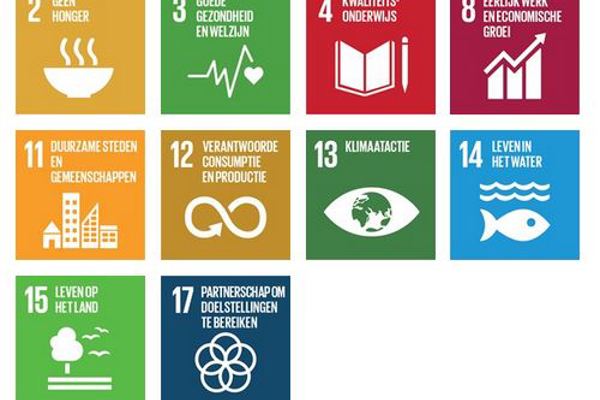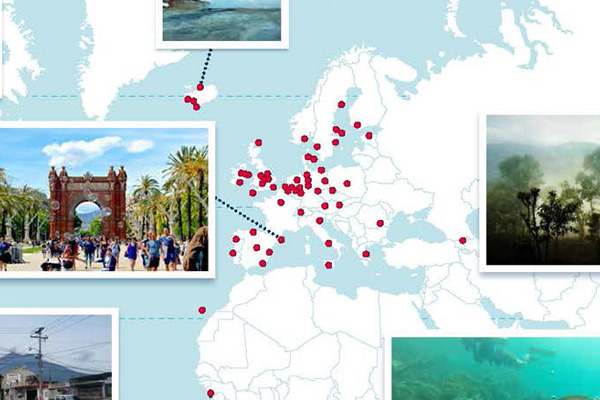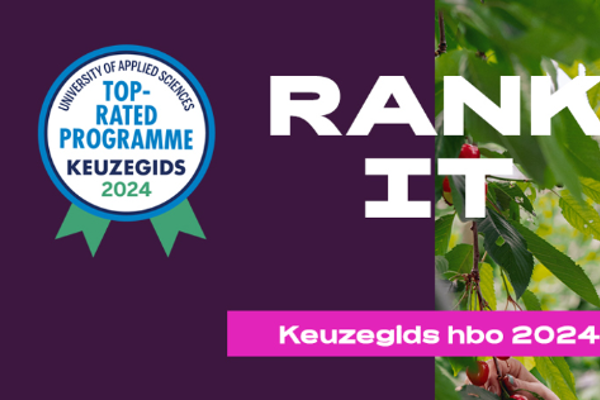More HAS
Find out all about HAS green academy here.
HAS green academy
Unifying organisation and pioneer
As an explorer from, for and with the green sector, HAS green academy brings momentum and progress. The size and complexity of the social issues in the field of agriculture, food and the living environment call for new answers and new solutions. HAS actively seeks connections and opportunities to this end. Opportunities it capitalises on through entrepreneurship, inclusivity and curiosity.

Mission
HAS green academy is the knowledge institution where everyone with a passion for the green domain can continually develop to contribute optimally to a future in which there is sufficient healthy food in a healthy living environment.
Vision
The developments taking place in society, the green domain and higher education require a university of applied sciences that continues to develop into a knowledge institution of the future. This translates into:
- ambitious education programmes for students and professionals
- leading research into a limited number of focus areas
- customisation in cooperation with the professional field
- new steps to give substance and meaning to Lifelong Development (LLO)
- strengthening the international profile.

Strategy
We will translate the mission and future vision into eight challenging ambitions that will guide us in the coming years:
- making smarter choices and decisions based on our mission
- further expansion of our education portfolio
- improving research culture
- strengthening our collaborative relationships with partners and the industry
- developing sustainable links with international partners
- working towards a more agile professional organisation
- increasing the sustainability of our organisation and buildings
- improving our positioning and visibility
Read the full Institution Plan 2024 – 2027 of HAS green academy
The organization
Organization structure
Legal and internal organisational structure
HAS green academy is a non-profit educational foundation (Stichting HAS Opleidingen) that has built its organisational structure around the following processes:
- Administrative: the Executive Board is the competent authority and is accountable to the Board of Trustees
- Primary processes: clusters are responsible for our core activities: education, research and contract work
- Supportive processes: the staff departments carry out tasks supporting education, research and contract work
Board of Trustees and Executive Board
The Board of Trustees and the Executive Board are responsible for the supervision and management of HAS University of Applied Sciences. The boards are supported by the Board Secretariat.
Both the BExecutive Board and the sectors make use of the following staff services:
- Marketing & Communication
- HAS Services
- Computerisation & IT
- Finance & Control
- Finance & Reporting
- Human Resources
- Student Affairs / International Office
- Health Coach
Organization Chart
The Executive Board
The Executive Board consists of 2 members:
Dr. Ir. R. P. J. (Reggy) van der Wielen, Chairman.
Drs P. H. G. J. (Patrick) Cramers, Vice chairman.
The Supervisory Board
The Supervisory Board oversees the Executive Board of HAS green academy. The Advisory Boards' tasks are drawn up in the statutes of Stichting HAS Hogeschool.
Appointment of members of Supervisory Board
Supervisory Board members are appointed for a period of 4 years, and are eligible for reappointment for a period of four years. Stichting HAS Hogeschool statutes define the appointment procedure.
Members of Board of Trustees
The Board of Trustees of HAS green academy has five members:
- drs. Ir. A.N. (Anita) Wouters, chairwoman
- drs. W.T.G. (Wim) Bens, vice-chairman
- mr. drs. S.A.H. (Susanne) Görtz-Kniest, member
- drs. E. (Egon) Verheijden, member
- ir. A.J. (Albert) Vermuë, member
Accountability and supervision
The Executive Board is accountable to the stakeholders at the same level. Employees and students can make their voices heard through representative bodies, among other options. HAS green academy is actively involving students, employees and industry in education, research and contract work. To measure stakeholder satisfaction, HAS green academy regularly holds satisfaction surveys among students, employees and industry.
Separation public - private
HAS green academy takes the view that contract work is in support of the main objective of education. The objectives are knowledge transfer, cross-fertilisation with business, an increase in quality and/or efficiency, contributing to lifelong learning or promoting the accessibility of education. In this view contract work is inseparable from the core activity of education. Internal guidelines for pricing ensure that any contract work carried out at least covers costs.
Students
Besides contacts with students through the University council and Education committees, a General Student Consultation is organised twice a year. The General Student Consultation consists of members of the Board of the student associations (Alpha and Gremio Unio), student members of the University Council and Programme Committees, representatives of the various student associations and annual consultative groups of the course of Applied Biology.
Employees
Regular public meetings are held for all employees, on topics like the governance structure and the sector classification. In addition to the public meetings, there is an open culture within HAS green academy, giving all employees the opportunity to contact a supervisor with their questions and comments. All official documents are published on the intranet, as is a shortened report of the BExecutive Board meeting and resolutions of the Supervisory Board.
University council
The University Council (UC) represents the interests of staff and students. The UC participates in thinking through and deciding on policies and changes within HAS green academy, and is a discussion partner of the BExecutive Board. Both staff and students represent the council and have the same rights and obligations (for more information see WHW articles 10.16a to10.39). The UC has fourteen seats. Seven are occupied by employees and seven by students. The council shall elect an Executive Board of four members; the chairman, the vice-chairman and two student members. Each council member serves on one of the UC committees.
Education committees
Every programme within HAS green academy has an education committee consisting of programme staff and students. The committee advises on matters (also see WHW article 10.3c) related to education such as:
- Teaching and examination regulations
- Annual teaching report
- Policies aimed at improving the quality and feasibility of the programme
- Teaching guidance
- Student and teaching facilities
Stakeholder engagement
The Executive Board is horizontally accountable to stakeholders. Stakeholders in particular are those parties that give meaning to teaching and research. These include students, employees and industry.
Stakeholders – Teaching
Industry is structurally involved with the content and design of the existing programmes through field interviews at an institutional level. Students can influence this through the University council and programme committees. The government is involved through its accreditation systems. For new programmes targeted research is done into the needs of industry (often including local and regional authorities) and student interests. The government is involved through quality and macro-efficiency assessments of applications for new programmes. Moreover, industry participates in focus groups/advisory committees to be set up for the project-based development of new programmes.
Stakeholders – Research
Stakeholders are directly involved in research policy. In lecturer meetings agreements are reached on research programmes and quality assurance of research. Contact with the environment is maintained through advisory boards of individual institutes, representation of industry in knowledge networks, collaboration with national and international institutes of education and research projects for SMEs.
Stakeholders – Contract work
Companies, institutions and individual clients are the key stakeholders for the business market. They are indicative of market demands and involved in the development of various trainings and courses. The range is designed in close consultation with entrepreneurs (the external advisory group) and institutions in the region. The advisory group is also closely involved in shaping a logical, collegial and generally accepted positioning of the business activities within the public domain among private suppliers. Networks like Kennispoort, 5-Star Region and Brabant-Zeeland Employers Associations regularly assess whether the supply meets the demand.
Legal affairs
Do you have questions of a legal nature? For example, about decisions or questions about appeals?
Then you can contact HAS green academy's legal affairs department. On HAS green academy's intranet you will find all regulations and documentation relevant for your studies.
Do you have any additional questions? Then contact the administrative secretary Marjet Overmars via the email address of legal affairs hasjuridischezaken@has.nl.
Sustainable Development Goals
HAS green academy contributes to the Sustainable Development Goals (SDG's)
It is obvious that our world is changing at an unprecedented rate. This entails a series of social challenges in the agri-food and living environment domain.
For example, agri-food companies have to operate as sustainably, climate-neutral and circularly as possible within ten to fifteen years. At the same time, international food production must be increased and safety guaranteed. Nutritionally, the food must become much healthier. And all against a drastically changing background. The migration to the cities, the changing climate, the aging agricultural workforce, the changing field of distribution and so on. In the meantime, these challenges also offer many opportunities for everyone who is aware of them.
SDG's as a guiding framework
Based on its mission, HAS University of Applied Sciences is fully committed to contributing to the 17 Sustainable Development Goals (SDGs) of the United Nations (UN): sustainable development goals that, according to the UN, "should make the world a better place in 2030". These development goals follow the 2000 millennium goals and focus not only on development goals, but also on sustainability. They are regarded as an important guiding framework worldwide.

Internationalisation
The Netherlands has the ambition to reach the global top 5 of knowledge economies. This requires internationally orientated education policy. Those in education who look inward will not be attuned to the global labour market for higher education.
Internationally active organisations demand knowledge workers who are used to looking across borders. So it's essential for students to gain international experience while still studying.
Strengthening the international profile of HAS green academy fits the growing importance of international knowledge in professional practice. We do this by offering our students and staff international opportunities.
Student and staff mobility
Erasmus+ is the European subsidy programme for Education, Youth and Sport. The programme supports student and staff mobility within Europe.
HAS green academy has been awarded the Erasmus Charter for Higher Education.

WE ARE THE BEST GREEN UNIVERSITY OF APPLIED SCIENCES
Like last year, the HAS green academy has 6 top programmes according to the Keuzegids Hbo 2024. A result we are very proud of! Our total score this year is 70 and in the category of medium-sized colleges, we are in 5th place. This means we remain the best green university of applied sciences in the Netherlands.

Cedeo

HAS green academy is the leading university of applied sciences provider for professionals in agribusiness, food and living environments. We have been supporting professionals in their ambition to grow in their careers for over 25 years.
We continue to invest in our training courses and in (long-term) relationships with our clients. And with success: our current clients value our approach with a 9.7 for our customised programmes and a 9.8 for our business courses (tested by Cedeo).



